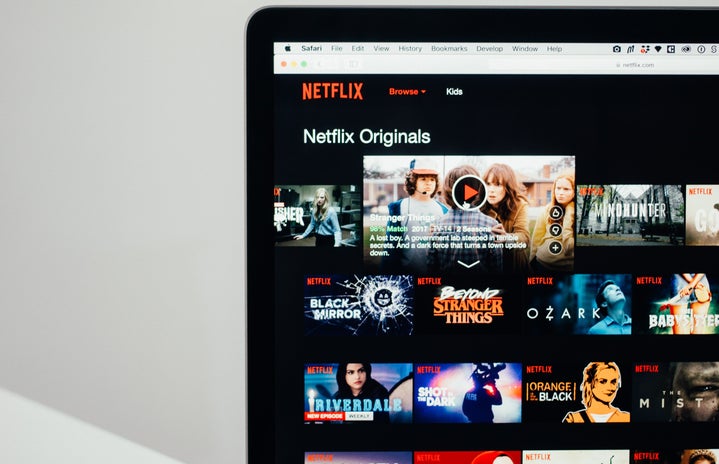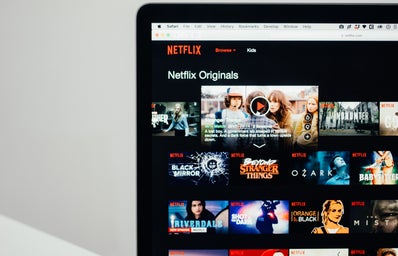*Please note that this article mentions mature themes and sensitive subjects that may be triggering to some readers.*
Okay, let’s cut to the chase: Recent shows aimed at teenage audiences are extremely dark. I think it’s quite funny when young adults in their 20s voice their weird fascination and obsession with watching teen shows featuring high schoolers and acknowledge that these shows are problematic, overly dramatic, or downright cringey at times. Platforms like Netflix and networks like the CW are content-making machines that constantly pump out dark, edgy television shows about teenagers dealing with real-world, hard-hitting issues like sexuality, drug addiction, mental health issues, and more. I’m sure that from just reading the title of this article several examples of popular teen shows come to mind, such as Riverdale, Chilling Adventures of Sabrina, 13 Reasons Why, Elite, Outer Banks, Euphoria, Gossip Girl, Pretty Little Liars, and The Vampire Diaries. Even though the last few are more from the mid-2000s era of television, all the shows I’ve listed contain those darker themes and visual aesthetics that many have come to associate with popular teen shows. So why has this media trend become so popular, and more importantly, why are adults creating this kind of content for teenage audiences to consume, that are oftentimes so out of touch with how teenagers actually think or behave?
In a way, I think we all know why teen shows have gotten darker as the years have progressed, but it’s not something people talk about nor is it something I think they want to talk about. Generally, television shows in the past decade have become increasingly dark, as TheEverygirl notes, and they cite two key pieces of information given by Ken Tucker during a discussion with the BBC and Dr. Margee Kerr, a verified Scare Specialist. That is, not only does scarier, more thrilling content do a better job than lighter content of keeping audiences glued to their screens, but some human brains actually get dopamine rushes from the fight-or-flight response to the feeling of real fear (TheEverygirl). So, yes, overall, television shows have gotten darker over the past decade, but how does this apply to modern teen shows?
Unfortunately, as these StyleCaster and Nylon articles point out, this trend is evidently a product of the cruel and unfriendly world that teenagers have had to grow up in, which includes, but is not limited to, school shootings, mental health issues, suicide, drug and alcohol addictions, and sexual assault. These are not light subjects in the slightest, and while I think it is imperative that the media tries to address these issues that teenagers go through, they don’t always do it well and they aren’t always accurate. Pair the darker themes with dark visual aesthetics to match, and everything just becomes completely dramatic in overtone. It especially concerns me when TV perpetuates the idea that everyone is having sex in high school or that smoking and partying constantly are common activities that all teenagers do—and most of the time the characters onscreen are played by adult actors and actresses, too.
I’ll be honest, the reason I’ve become intrigued by this trend in teen television is because of the recent release of the Netflix adaptation of The Winx Club series, which first aired on networks like Nickelodeon and 4Kids back in the early to mid-2000s. I absolutely adored Winx because of its diverse cast, bright and colorful animation, and its message that you can have strong, empowered female characters that still own their femininity. So when Netflix released their trailer for their own adaptation of Winx titled Fate: The Winx Club Saga this January, the internet went ballistic, myself included. The show seemed nothing like the one many people my age had known and loved! How could the showrunners say that it was aimed at our audience demographic and yet take away key elements, such as the colorfulness and the diversity?
I highly recommend watching ModernGurlz’s video on the Winx adaptation because they do a very good job at both critiquing and highlighting certain elements of Fate: The Winx Club Saga, as long as you don’t mind some spoilers from the show. I initially was going to watch it just to see for myself what it was really like, but after watching their video, I’m not so sure anymore. Who knows, maybe I still will. I certainly dragged my feet watching After and The Kissing Booth, so maybe I just like subjecting myself to terrible teen shows and movies for the sake of being “in the know” about popular media aimed at teenagers even though I’m technically no longer a teenager.
What I’m trying to get at is something that ModernGurlz and many other commentary channels on YouTube that I watch, as well various articles that I’ve read on this subject, touch upon, which is that you can talk about mature, real issues the audience will identify with and relate to without having such extremely dark, edgy dramas. And additionally, why the heck do studios and networks insist on taking lighthearted, fun media and turning them dark? We have Riverdale that was based on the classic Archie comics; Chilling Adventures of Sabrina based on the quirky 90s show Sabrina the Teenage Witch; and of course, we now have the new Winx Club adaptation by Netflix. I’m tired of turning up my brightness and seeing characters dressed in muted tones, only to later be blinded when suddenly there’s light. I’m tired of the constant featuring of toxic relationships and adult characters that serve no real authoritative role or only create more problems in the show. Understandably, real life isn’t all sunshine and rainbows, and I’ll be honest, some of these shows are actually pretty good, but television shows for teenagers have just been increasingly dark that it’s become a moral question of whether or not that is actually a good or bad thing.
I don’t think dark teen shows are going to go away anytime soon, but I do hope that in terms of things as small as accurately capturing how teenagers think and act, (Like why do the characters from Euphoria always add the F-word in their sentences? Teenagers swear but they don’t do it like that unnecessarily), to big things like identity representation, (Not whitewashing characters and not only choosing actresses of one variation of skin tone), become rectified in the near future by networks and studios. Anyways, I think I’m going to finally bring myself to watch After We Collided and The Kissing Booth 2 now, wish me luck.






